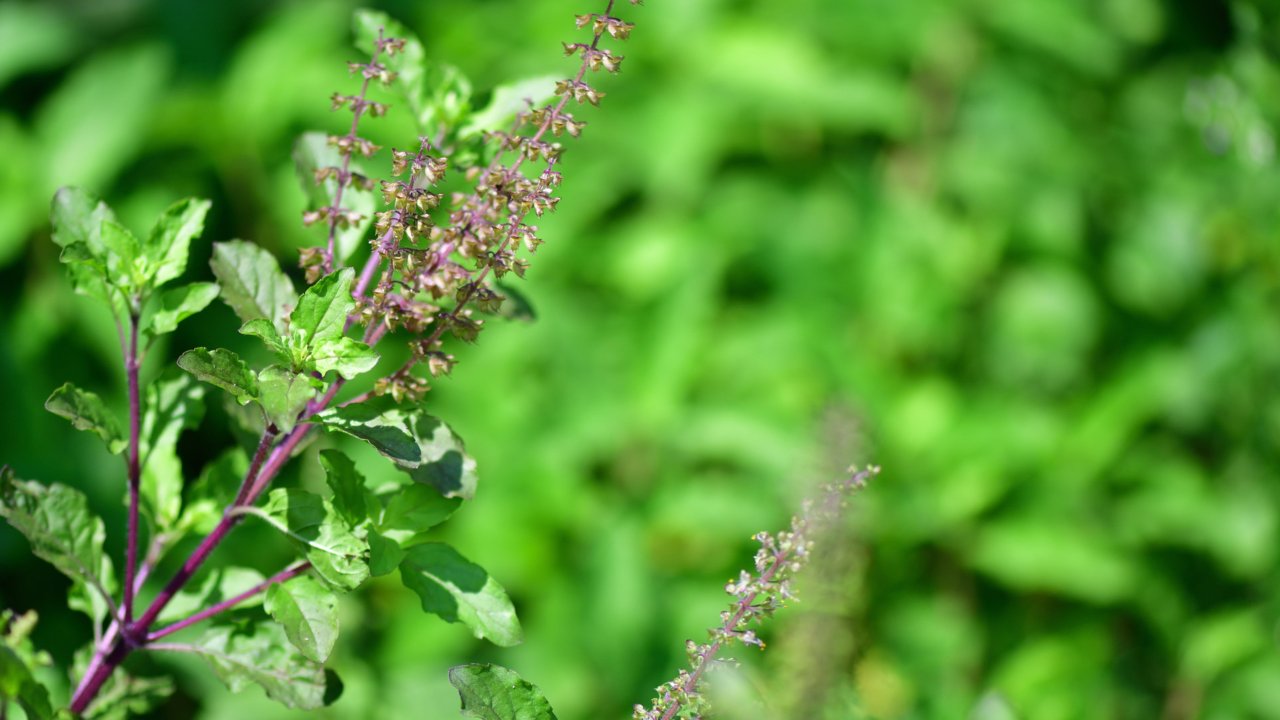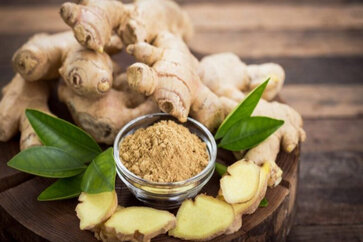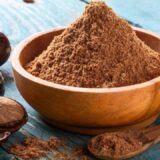Krishna Tulsi: Medicinal Uses and Benefits of Fresh Leaves
Ocimum sanctum, commonly known as Tulsi, is also spelled Tulasi or Tulsai. The term “Tulsi” comes from Sanskrit, meaning “matchless one,” while in English, it is referred to as Holy Basil. Tulsi holds a revered place in Hindu culture due to its rich mythological significance. 
It is believed that Tulsi is the consort of Lord Krishna, and its unique properties set it apart from other herbs. This sacred status has led to the tradition of planting Tulsi at the center of courtyards in Hindu homes.
There are several varieties of Tulsi (Ocimum sanctum), though most share similar chemical constituents. The Ocimum genus includes approximately 50 to 150 species of herbs and shrubs, primarily found in the tropical regions of Asia. Below is information about the Tulsi plant and its common varieties found around the world.
Types of Tulsi Plant with Ocimum Scientific Name
-
- Tulsi : Ocimum sanctum L.
- Krishna Tulsi: Ocimum tenuiflorum
- RamTulsi: Ocimum gratissium
- Dulal Tulsi: Ocimum canum
- Ban Tulsi: Ocimum basilicum
- Camphor basil: Ocimum kilimandscharicum
- American basil/ Hoary basil: Ocimum ammericanum
- Amazonian basil: Ocimum micranthum
- Lemon Basil: Ocimum africanum
In Ayurveda, Tulsi is revered as the “Queen of all herbs” due to its extraordinary versatility and adaptability, much like a queen’s ability to address various issues.
This potent herb is effective for treating a wide range of ailments, including respiratory conditions such as asthma, bronchitis, congestion, and colds.
Tulsi is also renowned for its ability to mitigate the harmful effects of smoking. The use of Tulsi in medicine dates back thousands of years, with Ayurvedic texts indicating its therapeutic use as early as 4000-5000 B.C.
Additionally, references to Tulsi can be found in the Rigveda, written between 3500-1600 B.C., which highlights its historical significance in medicinal practices.
Tulsi’s importance extends beyond Ayurveda and Siddha; it was also valued in ancient Roman and Greek medicine. Its wide array of medicinal properties has long been recognized across different cultures and civilizations.
Ayurvedic Properties
In Ayurveda, tulsi (Holy Basil) is revered as a highly beneficial herb with a broad spectrum of therapeutic properties. Its various attributes make it a cornerstone of Ayurvedic medicine. Here’s a detailed look at the Ayurvedic properties of tulsi:
1. Tridoshic Balance
Tulsi is considered a tridoshic herb, meaning it helps balance all three doshas (Vata, Pitta, and Kapha) in the body. This balancing effect supports overall health and well-being.
2. Rasa (Taste)
Tulsi has a combination of bitter, pungent, and sweet tastes. The bitter and pungent tastes help reduce excess Kapha and Pitta, while the sweet taste provides a soothing effect.
3. Virya (Potency)
Tulsi is described as having Ushna (heating) potency. This heating quality helps stimulate digestion, improving circulation, and enhancing metabolic functions.
4. Vipaka (Post-Digestive Effect)
The post-digestive effect of tulsi is sweet. This means that, after digestion, tulsi’s effects are soothing and can help balance the body’s internal environment.
5. Action on Doshas
- Vata: Tulsi helps to calm and stabilize Vata dosha, which is associated with qualities like dryness and coldness.
- Pitta: It balances Pitta dosha, which is related to heat, inflammation, and acidity, making it useful for conditions like heartburn and inflammatory disorders.
- Kapha: Tulsi helps to reduce excess Kapha, which is linked to congestion, lethargy, and accumulation of mucus.
Parts of the Plant Used
In traditional and modern herbal practices, various parts of the tulsi (Holy Basil) plant are utilized for their medicinal and therapeutic properties. Each part of the plant contributes differently to its overall health benefits:
1. Leaf
The leaves of the tulsi plant are the most commonly used part and are highly valued for their wide range of medicinal properties.
- Medicinal Uses: The leaves are rich in essential oils, including eugenol, linalool, and methyl chavicol, which contribute to their antimicrobial, anti-inflammatory, and adaptogenic properties. They are commonly used to prepare herbal teas, extracts, and tinctures.
- Health Benefits: Tulsi leaves are used to alleviate respiratory issues such as coughs and colds, support digestive health, reduce stress, and boost the immune system. They are also applied topically to treat skin conditions and wounds.
2. Seed
Tulsi seeds, though less commonly used compared to the leaves, also offer several benefits.
- Medicinal Uses: The seeds are known for their nutritional value and can be used to prepare herbal concoctions or as a dietary supplement. They contain essential fatty acids and beneficial compounds that contribute to overall health.
- Health Benefits: Tulsi seeds are used to support digestive health, improve metabolic function, and promote skin health. They are often used in traditional remedies for their cooling and soothing properties.
3. Root
The roots of the tulsi plant are used in some traditional practices and are known for their unique medicinal properties.
- Medicinal Uses: The roots are less commonly used in contemporary medicine but have been traditionally valued for their therapeutic effects. They are sometimes used in Ayurvedic formulations and herbal remedies.
- Health Benefits: Tulsi root is believed to have adaptogenic properties, helping to combat stress and enhance resilience. It is also used for its potential benefits in improving joint health and reducing inflammation.
Each part of the tulsi plant contributes to its overall therapeutic profile, making it a versatile herb with a wide range of applications in health and wellness.
Whether used for its leaves, seeds, or roots, tulsi remains a valuable herb in both traditional and modern medicine.
Different Varieties of Tulsi
Tulsi, or Holy Basil, comes in several distinct varieties, each with unique characteristics and uses. Here are three prominent types of tulsi:
1.Rama Tulsi (Ocimum sanctum):
Also known as Green Leaf Tulsi, Rama Tulsi is characterized by its green leaves and light purple flowers. This variety is renowned for its aromatic flavor, which is largely attributed to the presence of eugenol, a compound that imparts a mellow aroma and taste. Rama Tulsi is commonly used in culinary applications and traditional medicine for its soothing and balancing properties.
2. Krishna Tulsi (Ocimum tenuiflorum):
Known as Shyama Tulsi, Kali Tulsi, or Purple Leaf Tulsi, Krishna Tulsi features dark purple leaves and offers a distinct aroma with a peppery flavor. This variety is highly valued in Ayurvedic practices for its potent medicinal properties, including its role in enhancing respiratory health and reducing stress. Its rich flavor and color make it a popular choice for both health remedies and decorative purposes.
3. Vana Tulsi (Ocimum gratissimum):
Often referred to as Wild Leaf Tulsi, Vana Tulsi is distinguished by its bright green leaves and its lemony flavor. This variety grows wild and is native to Asia and North East Africa. While it does have an aromatic profile, its flavor is somewhat tangy, resembling lemon. Vana Tulsi is utilized in various traditional practices and is known for its broad therapeutic applications, including its antimicrobial and digestive benefits.
Each variety of tulsi offers distinct attributes, making them suitable for different applications in health, wellness, and culinary practices. The diversity of tulsi species underscores its importance and versatility in both traditional and contemporary settings.
Chemical Constituents of Tulsi Leaves
Tulsi, or Holy Basil, is known for its rich and diverse chemical composition, which contributes to its extensive medicinal properties.
The primary chemical constituents of tulsi include essential oils, carbohydrates, flavonoids, and various bioactive compounds. Here is an overview of these constituents and their roles:
1. Essential Oils: Tulsi contains a complex mixture of essential oils that are responsible for many of its therapeutic effects. These oils include:
- Linalool: Known for its calming and anti-anxiety properties, linalool also possesses antimicrobial and antioxidant benefits.
- Methyl Chavicol: This compound has potent antimicrobial and antifungal properties, helping to combat infections.
- Nerol: With its sweet, floral scent, nerol contributes to tulsi’s anti-inflammatory and antimicrobial effects.
- Geraniol: This component provides antimicrobial and anti-inflammatory benefits, as well as a pleasant fragrance.
- Citral: Citral has strong antibacterial and antifungal properties, contributing to tulsi’s ability to fight infections.
2. Carbohydrates: Tulsi contains various carbohydrates, which play a role in providing energy and supporting metabolic functions.
3. Flavonoids: These are a group of plant compounds with potent antioxidant and anti-inflammatory properties. In tulsi, flavonoids help in neutralizing free radicals, reducing oxidative stress, and providing overall health benefits.
4. Proline: An amino acid that contributes to the stability and functionality of proteins. Proline in tulsi aids in tissue repair and supports overall metabolic functions.
5. Ursolic Acid: This triterpenoid has been shown to possess anti-inflammatory, antioxidant, and anticancer properties. Ursolic acid contributes to tulsi’s role in reducing inflammation, supporting immune function, and protecting against cellular damage.
The synergistic effect of these constituents makes tulsi a powerful herbal remedy with a wide range of health benefits.
Its chemical profile supports its use in treating various ailments, from respiratory and digestive issues to cardiovascular health and stress management.
Medicinal Uses of Tulsi in Ayurveda
Tulsi, or Holy Basil, holds a revered place in Ayurveda due to its extensive medicinal uses. Its versatile therapeutic properties address a wide range of health conditions, making it a cornerstone of Ayurvedic medicine. Here’s how tulsi is used for various ailments:
- Ashma (Kidney and Bladder Stones): Tulsi helps in managing and alleviating the discomfort associated with kidney and bladder stones. Its diuretic properties aid in flushing out stones and preventing their formation.
- Kushta (Skin Diseases with Pain or Itchiness): For skin conditions characterized by pain or itchiness, tulsi provides relief through its anti-inflammatory and antimicrobial properties, promoting healthier skin and reducing symptoms.
- Parshvaruk (Pain in the Flanks): Tulsi is beneficial for relieving flank pain, often associated with conditions like renal colic or other abdominal issues. Its analgesic and anti-inflammatory effects contribute to pain management.
- Vamihara (Vomiting): It offers relief from vomiting through its anti-emetic properties. Tulsi helps in calming the stomach and reducing nausea, providing comfort during digestive disturbances.
- Hidhmahara (Repeated Hiccups): Tulsi can be effective in addressing repeated hiccups. Its soothing properties help calm the diaphragm and reduce the occurrence of hiccups.
- Kasahara (Cough and Cold): Tulsi is widely used to treat coughs and colds. Its expectorant and anti-inflammatory effects help clear mucus and soothe the respiratory tract, offering relief from respiratory discomfort.
- Shwasahara (Chronic Respiratory Disorders like Asthma): Tulsi supports the treatment of chronic respiratory disorders, including asthma. Its bronchodilator and anti-inflammatory properties aid in managing symptoms and improving respiratory function.
- Hrudya (Reducing Cholesterol Deposition): It helps in reducing cholesterol deposition in blood vessels, contributing to cardiovascular health by preventing atherosclerosis and improving overall heart function.
- Agnivardhini/Vahni Deepani (Promoting Digestion Strength): Tulsi strengthens digestive functions and enhances metabolism. It aids in improving digestion and alleviating digestive issues like indigestion and bloating.
- Ruchikrut (Improving Taste and Relieving Anorexia): Tulsi improves taste and stimulates appetite, making it beneficial for those suffering from anorexia or loss of appetite. Its digestive properties help enhance overall food intake and nutritional absorption.
Tulsi’s broad spectrum of uses in Ayurveda highlights its significance as a multifaceted herb that supports various aspects of health and well-being. Its inclusion in daily health regimens can contribute to both preventive and therapeutic care, embodying the holistic principles of Ayurvedic medicine.
Medicinal Properties of Tulsi
Tulsi, also known as Holy Basil, is celebrated for its extensive range of medicinal properties, making it a cornerstone of traditional Indian medicine and modern scientific research alike.
Extensive studies on tulsi—across in vitro, animal, and human models—highlight its remarkable versatility in promoting health and treating various conditions. Here are some key medicinal values of tulsi:
- Antibacterial: Tulsi effectively combats bacterial infections, helping to prevent and treat illnesses caused by bacteria.
- Antiviral: It has antiviral properties that aid in fighting viral infections, offering protection against common viruses.
- Antifungal: Tulsi’s antifungal action helps to address fungal infections and promote overall skin health.
- Antiprotozoal: It is effective against protozoal infections, contributing to the management of diseases caused by protozoa.
- Antimalarial: Tulsi has been shown to have properties that are beneficial in preventing and treating malaria.
- Anthelmintic: It helps in expelling intestinal worms, thus supporting digestive health.
- Anti-thyroid: Tulsi may help manage thyroid function, providing support for individuals with thyroid disorders.
- Anti-fertility: It has been noted to influence fertility, offering potential benefits in reproductive health management.
- Anti-ulcer: Tulsi’s anti-ulcer properties contribute to the healing and prevention of ulcers in the digestive tract.
- Anti-emetic: It helps in reducing nausea and preventing vomiting.
- Anti-spasmodic: Tulsi can relieve muscle spasms and cramping, offering comfort in various conditions.
- Anti-arthritic: It may aid in reducing arthritis symptoms, supporting joint health.
- Adaptogenic: Tulsi helps the body adapt to stress, improving resilience and overall stress management.
- Anti-stress: Its calming effects help reduce stress and anxiety, promoting mental well-being.
- Anti-cataract: Tulsi’s properties support eye health and may help prevent cataracts.
- Anti-leukodermal: It assists in managing leukoderma, a condition characterized by skin depigmentation.
- Anti-asthmatic: Tulsi helps manage asthma symptoms, supporting respiratory health.
- Anti-tussive: It reduces cough and helps soothe the respiratory tract.
- Anti-diabetic: Tulsi can help manage blood sugar levels, aiding in diabetes control.
- Anti-hypercholesterolemia: It supports cardiovascular health by helping to lower cholesterol levels.
- Anti-hypertensive: Tulsi helps manage high blood pressure, contributing to heart health.
- Anti-carcinogenic: It may offer protection against cancer by inhibiting the growth of cancerous cells.
- Analgesic: Tulsi provides pain relief, making it useful for various types of pain.
- Anti-pyretic: It helps reduce fever, providing comfort during illness.
- Anti-allergic: Tulsi helps in managing allergic reactions and symptoms.
- Anti-diarrheal: It aids in reducing and managing diarrhea.
- Anti-oxidant: Tulsi combats oxidative stress, protecting cells from damage and supporting overall health.
- Anti-inflammatory: Its anti-inflammatory properties help reduce inflammation and associated discomfort.
- Chemopreventive: Tulsi offers protection against cancer by preventing the formation of cancerous cells.
- Central Nervous System Depressant: It has calming effects on the central nervous system, aiding in relaxation and mental calmness.
- Cardio-protective: Tulsi supports heart health and protects against cardiovascular diseases.
- Diaphoretic: It promotes sweating, which can help in detoxification.
- Hepato-protective: Tulsi helps protect the liver and supports its function.
- Immunomodulatory: It boosts the immune system, enhancing the body’s ability to fight infections.
- Mosquito Repellent: Tulsi’s natural compounds act as a repellent against mosquitoes.
- Memory Enhancement: It improves cognitive functions and memory, supporting brain health.
- Neuro-protective: Tulsi offers protection to the nervous system, aiding in overall neurological health.
- Radioprotective: It helps protect cells from damage caused by radiation, supporting overall cellular health.
Tulsi’s diverse range of medicinal properties underscores its importance as a versatile and powerful herb in traditional and modern medicine, offering a holistic approach to health and wellness.
Top 10 Benefits & Medicinal Uses of Krishna Tulsi
According to Ayurveda Tulsi is hot and bitter in taste, it is said that it penetrates into the deep tissues or dry tissue secretions and normalizes Kapha and Vata.
It is said that regular consumption of tulsi can prevent multiple diseases and also promote general health. Tulsi has health-promoting properties that are recommended for treatment in a variety of conditions such as cough, anxiety, diarrhea, asthma, dysentery, fever, and eye diseases.
It is also recommended for the treatment of arthritis, otalgia, vomiting, hiccups, cardiac, gastric, disorders, back pain, genitourinary, ringworm, malaria, and skin diseases besides this insect, snake, and scorpion bites also. Below are some details of Krishna Tulsi benefits.
1. Respiratory Health:
- Benefit: Krishna Tulsi alleviates symptoms of respiratory issues such as asthma, bronchitis, and cough. It also helps clear mucus from the airways and reduces inflammation in the respiratory tract.
- Use: Consuming tulsi tea or extracts can soothe inflamed airways, reduce coughing, and improve overall breathing, providing relief from respiratory discomfort and supporting lung health.
2. Stress Reduction:
- Benefit: As an adaptogen, Krishna Tulsi helps reduce stress and anxiety by balancing cortisol levels and supporting the body’s response to stress. It promotes emotional stability and mental well-being.
- Use: Regular intake of tulsi tea or supplements can help manage stress, enhance mood, and promote mental relaxation, making it easier to cope with daily pressures and maintain emotional balance.
3. Immune System Support:
- Benefit: Krishna Tulsi has strong antimicrobial and immunomodulatory properties that boost immune function and enhance the body’s ability to fight infections. It supports overall immune health and resilience.
- Use: Drinking tulsi tea regularly can enhance immune system function, improve resistance to common illnesses, and provide protective benefits against infections and diseases, supporting long-term health.
4. Anti-Inflammatory Effects:
- Benefit: The herb contains compounds that reduce inflammation, alleviating conditions like arthritis, muscle pain, and joint stiffness. It helps in reducing chronic inflammation and promoting joint health.
- Use: Tulsi oil can be applied topically to inflamed areas, or tulsi can be consumed to help reduce inflammation, alleviate pain, and support overall musculoskeletal health and comfort.
5. Digestive Health:
- Benefit: Krishna Tulsi aids digestion, alleviates indigestion, and reduces bloating, gas, and discomfort. It supports a healthy digestive system by enhancing the digestive process and soothing the gastrointestinal tract.
- Use: Consuming tulsi tea or extracts after meals can improve digestion, prevent digestive issues, and provide relief from bloating and gas, contributing to overall digestive health and comfort.
6. Blood Sugar Regulation:
- Benefit: Tulsi helps manage blood sugar levels by improving insulin sensitivity and regulating glucose metabolism. It may assist in controlling diabetes and preventing blood sugar spikes.
- Use: Incorporating tulsi into the diet or taking it in supplement form can support blood sugar regulation, improve metabolic health, and help manage diabetes, contributing to balanced glucose levels.
7. Skin Health:
- Benefit: Tulsi’s antibacterial and anti-inflammatory properties are effective in treating acne, skin infections, and inflammation. It helps in maintaining clear, healthy skin by combating bacterial growth and reducing redness.
- Use: Applying tulsi paste or using tulsi-infused skincare products can promote clearer skin, reduce acne outbreaks, and soothe skin inflammation, leading to healthier, more radiant skin.
8. Detoxification:
- Benefit: Krishna Tulsi supports liver function and helps detoxify the body by flushing out toxins and waste products. It promotes overall detoxification and supports the body’s natural cleansing processes.
- Use: Regular consumption of tulsi tea can aid in detoxification, improve liver health, and enhance the body’s ability to eliminate toxins, contributing to a cleaner, more efficient internal system.
9. Cardiovascular Health:
- Benefit: Tulsi helps reduce cholesterol levels, manage hypertension, and support overall cardiovascular health. It contributes to heart health by improving blood circulation and reducing the risk of heart disease.
- Use: Tulsi supplements or tea can be incorporated into a heart-healthy regimen to manage blood pressure, lower cholesterol levels, and support cardiovascular function, promoting overall heart wellness.
10. Mental Clarity and Focus:
- Benefit: Krishna Tulsi enhances cognitive function, mental clarity, and concentration by supporting brain health and improving cognitive performance. It helps maintain mental sharpness and focus.
- Use: Drinking tulsi tea or taking it as a supplement can help improve cognitive function, boost memory, and enhance concentration, making it easier to stay mentally alert and focused throughout the day.
Krishna Tulsi’s diverse range of medicinal benefits supports both physical and mental health, making it a valuable and versatile addition to wellness routines.
Here’s a detailed guide on methods of application and dosage for using tulsi essential oil, covering a variety of uses from aromatization to sanitation:
Air Aromatization (Aroma Lamp, Aroma Pendant):
- Dosage: 1 drop per 5 square meters of room area.
- Session: 20-40 minutes.
- Frequency: 1-3 times a day.
Individual Inhalation:
- Aroma Pendant or Stone: Place 1 drop on the pendant or stone.
- Napkin: Add 1 drop to a napkin and inhale.
- Personal Inhaler: Add 5-10 drops to the insert; inhale several times if needed.
- Frequency: 2-4 times a day for prevention.
- Duration: 15-30 minutes.
Mixture for Application and Massage:
- Dosage: 1 drop per 5 ml of base oil.
- Application Areas: Back, chest, feet (for colds), stomach (for internal organ issues), scalp, pulse points.
- Frequency: 1-4 times a day as needed.
Cooling Compress:
- Dosage: 1 drop per teaspoon of neutral hydrophilic oil.
- Preparation: Dissolve in half a glass of water.
- Application: Wet a cloth with the mixture and apply to hands, feet, or the affected area.
Bath:
- Dosage: 3 drops per 1 teaspoon of neutral hydrophilic oil.
- Preparation: Dissolve under running water.
- Duration: 15-20 minutes.
- Suppositories (Use only when other methods are inadequate):
- Dosage: 1 drop of tulsi per 9 drops of lavender or tea tree oil.
- Preparation: Mix 2 drops of the blend with 10 ml of melted cocoa butter + 2 drops of CO2 extract of calendula or nettle.
- Forming: Stir well, freeze in foil or narrow ice cube trays.
- Usage: Use at night before bed. Be aware of possible leakage onto underwear.
- Gargling or Mouthwash:
- Dosage: 1 drop per 5 ml of neutral hydrophilic oil.
- Preparation: Mix, then dissolve in water.
- Usage: Gargle or use as a mouthwash.
Spot Application:
- Dosage: Mix 1 part tulsi essential oil with 5 parts base oil (e.g., almond oil).
- Application: Apply only to nails.
- Creams, Gels, Mixtures:
- Dosage: 1 drop per 5 ml of base oil or 1 drop per 10 ml of gel/cream.
- Preparation: Blend well before use.
Adding to Shampoo or Organic Foam:
- Dosage: 1 drop per 5 ml or a single portion of shampoo or foam.
- Sanitation of Premises and Surfaces:
- Dosage: 10 drops of tulsi per 5 ml of solubilizer.
- Preparation: Mix with water and treat surfaces.
- Combine with: Lemon and tea tree essential oils for enhanced effectiveness.
Insecticide:
- Dosage: 7 drops of tulsi, 5 drops of peppermint, 2 drops of eucalyptus, and 2 drops of cinnamon bark per 3 ml of solubilizer.
- Preparation: Stir, add 30 ml of water, and pour into a spray bottle.
- Application: Spray on clothing and surfaces. Avoid applying directly to the skin.
These methods offer a versatile approach to using tulsi essential oil, from enhancing personal well-being to maintaining a clean environment.
Always ensure to conduct a patch test or consult a professional if you are using essential oils for the first time or if you have sensitive skin.
In Hinduism, Tulsi is considered a sacred plant and is often planted in courtyards or gardens of Hindu homes and temples. It is associated with the goddess Tulsi, who is revered as a symbol of purity and devotion. Regular worship and prayers to Tulsi are believed to bring spiritual benefits and protection.
Sources:
- 28. Holy Basil (Ocimum Sanctum)- A Comprehensive Review of Traditional Uses, Phytochemical Composition, Medicinal Properties and Future Directions(1)
- A review on phytochemical and pharmacological properties of Holy basil (Ocimum sanctum L.)(2)
- Holy Basil(3)
- A Review Paper on Tulsi Plant (Ocimum sanctum L.)(4)
- Tulsi – Ocimum sanctum: A herb for all reasons(5)


























Hai all…we are running a medicinal and herbal plants nursery near Adoior in Kerala and have organic varieties of Tulasi and over 300 other plants for various ailments and farming. Please get in touch by Whatsapp 9847237678 for any query. Thanks
Thank you for your valuable information on tulsi regards
Holy basil is a plant. It is originally from India but now grows in Australia, West Africa, and some Middle Eastern countries. It is used in Ayurvedic medicine as an “adaptogen” to counter life’s stresses. It is considered a sacred plant by the Hindus and is often planted around Hindu shrines. The Hindu name for holy basil, Tulsi, means “the incomparable one.” Medicine is made from the leaves, stems, and seeds. Holy basil is commonly used to help with anxiety and stress. But there is limited scientific research to support these and other uses. In cooking, holy basil is often added to stir-fry dishes and spicy soups because of its peppery taste. Cookbooks sometimes call it “hot basil.”
Thanks, it’s quite informative